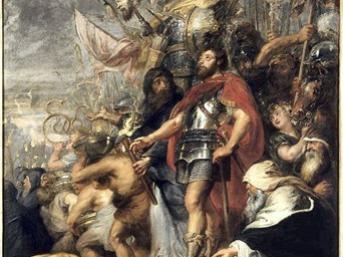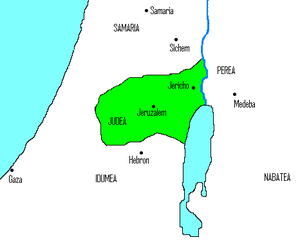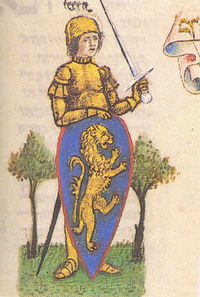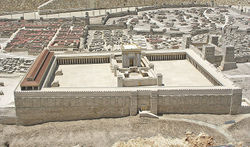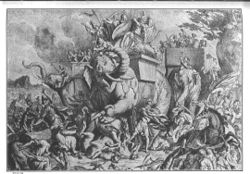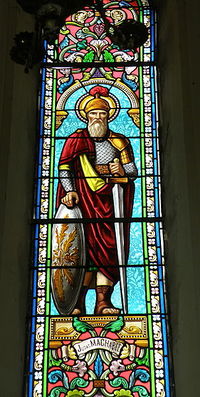Category:Judas Maccabeus (subject)
|
Judas Maccabeus (2nd century BCE), son of Matthatias, was a member of the Hasmonean dynasty. From 167 to his death in battle in 160 BCE, he led the Maccabean revolt against the Hellenists and the Seleucids. He was succeeded by his brother Jonathan Maccabeus; see Maccabees. He enjoyed great popularity among Christians in premodern Europe as one of the Nine Worthies, and among Jews for his connection with the Feast of Hanukka, and in the Zionist narrative, as a last champion of Jewish freedom and independence .
Judas Maccabeus -- Overview 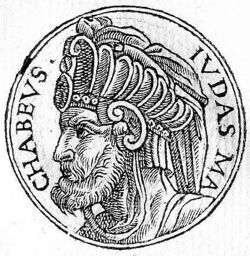 Judas Maccabeus (1553), by Guillaume Rouille  Judas Maccabeus as one of the Nine Worthies at the Castello della Manta, Saluzzo, Italy (15th cent.) Judas was the third son of Mattathias, a priest from Modin who started the rebellion against the high priest Menelaus and the Selecid king Antiochus IV Epiphanes. Judas and his brothers Jonathan and Simon, had immediately a prominent fighting role. After Mattathias' death in 166 BCE, Judah assumed leadership of the revolt, receiving the surname Maccabeus. He adapted a guerrilla strategy, which proved to be very effective and led his followers to a strings of victories against the Seleucid army. After rededicating the desecrated Temple in Jerusalem in 164 BCE, Judah conducted a series of attacks against the nearby cities. The counter-attack of the Seleucids led to truce and compromise. The appointment of Alcimus as the new High Priest forced Judas again to rebellion. In 161 BCE Judas obtained a dramatic victory against the Seleucid general Nicanor and tried to have the support of the Romans. However, the Seleucids were quick to send another army commanded by Bacchides which defeated and killed Judas in the Battle of Elasa in 160 BCE. Judas was succeeded by his brother Jonathan Maccabeus as leader of the rebellion. Judas Maccabeus, in literature & the arts
Judas Maccabeus enjoyed great popularity in Christian Europe in the 14th-17th centuries, ever since Jacques de Longuyon in 1312 included him among the Nine Worthies, or the greatest Kings in history. In the 17th-18th centuries the character took a life of his own as the protagonist of dramatic plays and oratorios; including Judas Macabeo (1641 Calderón de la Barca), play and Judas Maccabeus (1747 Haendel / Morell), oratorio. The rediscovery of the Jewishness of Judas as the leader of a national war of independence and the founder of the last independent Jewish state made him a popular hero not only among Jews and in the nascent Zionist movement but also as a champion of oppressed "national" minorities in Europe. References
External links
Ancient Sources |
Highlights
 Death of Judas Maccabeus, by José Teófilo de Jesus (1758-1847) 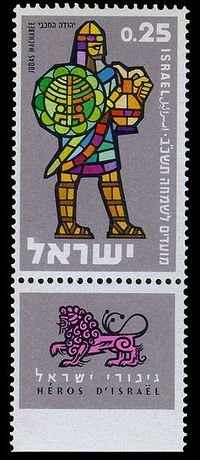 Israeli 1961 stamp of Judas Maccabeus, by A. Kalderon |
Pages in category "Judas Maccabeus (subject)"
The following 27 pages are in this category, out of 27 total.
1
- Love's Labour's Lost (1594 Shakespeare), play
- Judas Maccabaeus (1601 Haughton), play
- The Triumph of Judas Maccabeus (1636 Rubens), art
- Judas Macabeo (1641 Calderón de la Barca), play
- The History of the Nine Worthies of the World (1687 Burton), novel
- Judas Machabeus (1695 Cola), oratorio
- Juda Machabeus (1697 Pulci), oratorio
- Judae Machabei gloriosa in Deum fiducia (1702 Adolph), play
- (++) Judas Maccabeus (1747 Haendel / Morell), oratorio
- Judas Machabée; ou, Le rétablissement du culte à Jérusalem (1803 Massillian), play
- Giuda Maccabeo; ossia, La morte di Nicanore (1819 Crispi / Rasi), oratorio
- The First of the Maccabees (1855 Wise), novel
- Giuda Maccabeo (1859 Mariotti / Meini), oratorio
- Judas Makkabäus (1865 Bolander), novel
- Judas Maccabaeus (1872 Longfellow), play
- Judas Maccabaeus and the Jewish War of Independence (1879 Conder), book
- Judas Maccabäus (1879 Zopff), opera
- The Hammer (1890 Church), children's novel
- Judas Maccabaeus (1892 Goldfaden), play
- Juda Makabé (Judas Maccabeus / 1914 Fishta), play
- Juda Makkabäus (1919 Sandow), opera
- Giuda Maccabeo (Judas Maccabee / 1931 Quercetti / Recanatesi), opera (music & libretto)
- Judas Makkabäus (1943 Boxler), novel
- Judas Macabeo (1958 Aguirre), play
- Der Topos der Nine Worthies in Literatur und bildender Kunst (The Topos of the Nine Worthies in Literature and Visual Arts / 1971 Schroeder), book
- מלחמות החשמונאים (Judas Maccabaeus: The Jewish Struggle against the Seleucids / 1980 Bar-Kochva), book
- Judas Maccabaeus: The Jewish Struggle against the Seleucids (1989 @1980 Bar-Kochva), book (English ed.) = מלחמות החשמונאים
